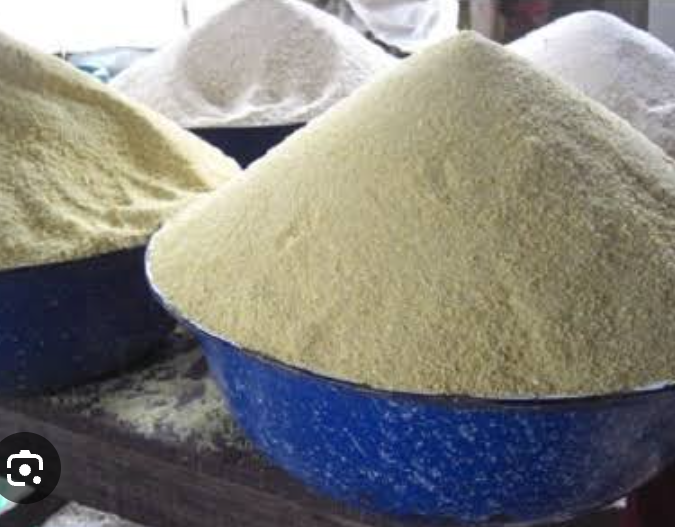News
Jubilation As Price Of Garri Drops

The price of garri, a staple food in most Nigerian households, has dropped by about 22 per cent in many markets in Enugu.
A survey by the News Agency of Nigeria correspondent in the city on Friday shows that a paint bucket of the white garri dropped from N3,500 to N2,500.
Also, the price of a paint bucket of the yellow variety sales for between N3,500 and N3,200 as against N4,000 and N3,700, depending on the brand.
Some of the dealers attributed the development to the ongoing cassava harvest in some part of the state.
A retailer at the New Market, Enugu, Nkechi Egbo, told NAN that a 100kg bag of white garri, which previously sold for N134,400, now goes for N105,000.
Mrs Egbo said that a 100kg bag of the yellow garri, which sold for N168,000 and N160,000, now sales for N142,000 and N147,000, respectively.
She further said that a milk cup of yellow garri that sold for N300 and N200 now goes for N250, N200 and N150 per cup.
Another retailer, who gave her name simply as Mama Ada, also attributed the drop in the price to high harvest in Ugbawka and Nara Communities in Nkanu East Local Government Council Areas.
She said that the price might further drop in the coming weeks as other communities in Enugu and Ebonyi States continue to harvest their last year cassava, while planting new ones.
Meanwhile, a farmer, Mathew Nwankwo, said the price of garri skyrocketed “because of the prices of other communities in the market and high cost of cultivating cassava”.
According to Mr Nwankwo, a farmer who sold garri will need to buy rice, beans and other commodities, which prices have doubled in the market.
“Aside this, we pay labourers N300 to prepare a ridge as against the previous N150.
“You will feed them twice a day and if you are farming in another person’s land, you also pay for the land.
“I live at Ugwuomu Nike and we pay for harvest, transportation, peeling, firewood, water, red oil to colour the garri as well as the people that fry it,” he said.
Mr Nwankwo said that he bought cassava stems worth N40,000 for his 10 plots of land and that it was not enough.
“All these expenses contributed to the high cost of the commodity in the market,” he further said.
A teacher, Vivian Okoro, described the drop in the price of garri as a welcome development.
Mrs Okoro said that many families in the country were finding it extremely difficult to buy the commodity due to its high price.
She, however, urged government at all levels to support farmers to make staple foods, such as rice, beans and garri, amongst others, affordable to the ordinary Nigerians.
News
HoR to Lead March, Launch Initiatives Against Gender-Based Violence

By Gloria Ikibah
As part of the annual 16 Days of Activism Against Gender-Based Violence, the House of Representatives is set to lead a historic march on Monday, November 25, 2024, in a bold effort to tackle gender-based violence (GBV) in the country.
The march, which begins at 8:00 AM, will see over 1,000 participants, including lawmakers and members of the public walk from the National Assembly to the Nigeria Police Force Headquarters in Abuja. The event will culminate in the submission of a petition to the Inspector General of Police, demanding decisive action against GBV and greater protection for vulnerable groups.
Speaking about the initiative, the Speaker of the House of Representatives, Rt. Hon. Abbas Tajudeen, PhD., GCON, said, “This march and the activities that follow are not mere gestures but a reflection of our determination to confront gender-based violence head-on. We are committed to building a society where justice, equality, and safety prevail for all Nigerians.”
In a statement by the House Spokesperson, Rep. Akin Rotimi on Saturday in Abuja, he said, “The 10th House of Representatives has reaffirmed its commitment to systemic reforms, collaboration, and accountability in the fight against gender-based violence.
“In addition to the march, the House has outlined key activities in alignment with its Legislative Agenda (2023–2027) to sustain awareness and action throughout the campaign period.
“Sash Demonstration Ceremony – Tuesday, November 26, 2024
“Convergence of State Assembly Speakers – Monday, December 9, 2024. A strategic meeting at the Transcorp Hilton, Abuja, will bring together Speakers of State Houses of Assembly to discuss legislative measures for combating GBV nationwide.
“National Citizens’ Summit and GBV Conference 2024 – Tuesday, December 10, 2024. The summit will focus on constitutional reforms and securing endorsements for gender equality initiatives led by the House of Representatives”.
Naijablitznews.com reports that this year’s 16 Days of Activism aims to galvanise nationwide efforts and inspire collective action to protect human rights, ensure justice, and create a safer, more equitable Nigeria.
News
NUJ-FCT Elections: Comrade Ike To Flag-Off Campaign With Free Medical Checks, Treatment


News
President Tinubu Leaves Brazil After G20 Summit

President Bola Tinubu has departed Galeao Air force Basa (SBGL) Airport, Rio de Janeiro, Brazil, on Saturday, for Abuja after attending the 19th G20 Leaders Summit in Rio de Janeiro, Brazil.
The President is due to arrive at the Presidential Wing of Nnamdi Azikiwe International Airport, Abuja, at 10.00 p.m. (Nigerian time).
President Tinubu had attended the G20 Leaders summit where he endorsed the global alliance against hunger and poverty, which he said was pivotal.
The President also held bilateral talks with Kristalina Georgieva, the Managing Director of the International Monetary Fund (IMF), who commended his administration’s economic reforms and their positive indicators.
He also presided over the signing of a 2.5 billion dollar Letter of Intent between the Nigerian government and the JBS S.A., a Brazilian company and one of the top three largest meat processing companies in the World.
The president was accompanied in the trip by senior government officials including the minister of foreign affairs yusuf Tuggar, the national security adviser, Nuhu RIBADU and many others.
-

 Metro13 hours ago
Metro13 hours agoBusinessDay Journalist Finally Regains Freedom From ‘One-Chance’ Kidnappers In Abuja
-

 Metro17 hours ago
Metro17 hours agoCourt remands 113 foreigners over alleged cybercrime
-

 Metro13 hours ago
Metro13 hours agoPolice recover stolen SUV after gun duel with robbers in Abuja
-

 News18 hours ago
News18 hours agoFull List: Innoson, Mitsubishi, Dantama , Others – CAC Delists 80,000 Companies
-

 News19 hours ago
News19 hours agoJapa: We’ve discovered over 10,000 fraudulent foreign student acceptance letters – Canadian Authorities
-

 Metro18 hours ago
Metro18 hours agoGunmen kidnap journalist’s relatives, demand N50m ransom
-

 News18 hours ago
News18 hours agoFG reinstates Ikechebelu and Modebelu as UNIZIK Acting VC and Registrar
-

 News13 hours ago
News13 hours agoFG insists Rivers State funds is intact was never stopped








